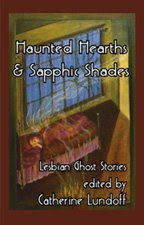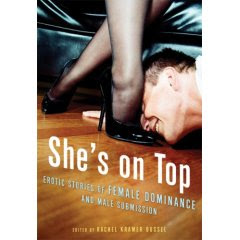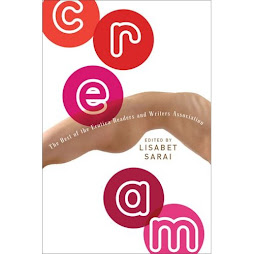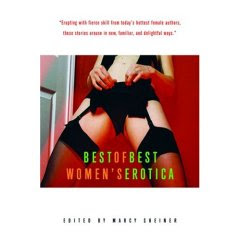My short story It's Lovely, It's Horrible. is in the ERWA Treasure Chest. I'm flattered they picked it for inclusion with the year's best.
This story is the basis for my novel Night Creatures. If you're following my series Writing This Novel, both on the ERWA blog and here in this blog, that title might sound familiar.
Thursday, January 31, 2013
Sunday, January 27, 2013
Writing This Novel part III
However you write is the right way
to do it. Forget The Rules. If you plot out everything ahead of time, good for
you. If you sit down and write with no idea where the story is going, that’s
great too. I’m telling you this because what follows is my weird method and I’d
hate for you to think it’s The Right Way or The Only Way to go about it.
I’m about thirty thousand words
into The Night Creature. It will
probably be around sixty thousand words when complete, so that’s theoretically
half way through. Now I’m in what writer Jim Grimsley so accurately described
as ‘the murk in the middle of the novel.’ If you’re into the journey through
the woods metaphor, this is the moment when you lose sight of the forest for
the trees. The ending seems unreachable. Maybe by now the story bores you. You
fell out of love with it once you got to know it better. Hey, it happens. I’m
wondering myself if I’m on the right track, if I’ll be able to tell the story I
set out to and if it’s worth telling even if I can. Yep, I’m stuck in the murk.
Several options here. 1)
procrastinate 2) blunder around until I discover the right path to the end, or
3) give up.
Many writers have procrastination
honed to a fine art. Deadline looming? Wash the dishes and vacuum the spider
webs off the ceiling. Have a cookie. Then decide you need tea with that. Or
scotch. Then go to FaceBook and look at cat memes. Stuck and floundering? Throw yourself into
research. The internet makes it so easy. You don’t have to head to the library
with focused questions and a limited amount of time and patience. Oh no. You
can look up the price of a Hermes scarf in British pounds, watch a YouTube
video of the 600 year anniversary light show for the astronomical clock in
Prague, and scour maps of Lake Geneva for the exact location of the villa where
Mary Shelley wrote Frankenstein.
These are actual examples of research I did for my novel. Google Maps with
street view is a fantastic tool. I found out there are no cafés on the same
street as the Hermes store in Paris. I also know there are five Hermes
boutiques in Paris, but I showed some restraint and only looked at one. I know what
houses look like in the old city section of Prague. I know which trains I’d
take from Paris to Prague, or from Lake Geneva to Milan. Most of this I don’t
need to know and will not use and I knew that
at the time I looked it up but I did it anyway. Eventually, I had to get quite
stern with myself and stop playing around with the wealth of information out
there. As Mary Poppins says, “Enough is as good as a feast.”
Writing articles about writing a
novel is a great procrastination technique, by the way. But now people are tracking
my progress, so I feel a little pressure to stop screwing around and get it
done.
Too much procrastinating is a bad
habit, but it can be useful. It gives me time to step back from the story for a
while and mull over the story arc and insights into who the characters have
become as the story unfolds. The order of events tightens into focus. It’s a
chance to play around with ideas before I commit them to words, or so I tell
myself. The problem is that I’m stuck and until I can move forward, fooling
around with research seems as useful as staring at that damned blinking cursor.
What comes next? I have no idea! Leave me alone, you nagging black line of
doom!
Yeah, yelling the cursor isn’t
productive.
One trick to avoid being stuck:
When you finish a writing session, get one or two sentences of the next scene
down before you stop. That way you’re primed to move on when you open the file
the next time. Or stop just short of the natural end of the scene. If you have
an easy writing prompt to start with, you’re more likely to type the next
sentence.
But what do you do if that doesn’t
work? This is where the ‘this works for me but I don’t recommend it’ part comes
in. The blundering about method. I go over what I’ve already written and
tighten it up. You’re not supposed to start editing until the first draft is
complete. The reason for that ‘rule’ is that some writers futz around with
their first chapters forever and never move on. The reason I break the rule is
that rules are really only guidelines, and guidelines are code for ‘this works
for many people.’ That’s no guarantee it will work for you and I’ve found it
doesn’t for me. That being said, the first novel you write, your major goal
should be to finish it. Millions of people begin novels. Few finish them.
Finish yours. Revel in the accomplishment. Slog through to the end no matter
what. Then go back and edit. (says the woman who admits she doesn’t do it that
way)
I try to write a linear, meaning that I don’t
tend to write scenes out of order. Every sentence in your story should have
forward momentum toward the end. Jumping ahead or behind disturbs the forward flow
of the narrative. (That can be fixed in the editing process) But just because
that’s what I prefer to do doesn’t mean it’s what I really do. A few days ago I
wrote a wonderfully evocative scene but realized later that it occurred too
early in the emotional arc of the story. Normally, I’d just delete it and write
it again later.
You’re probably screaming right
now. I know, I know. You’re supposed to save all your precious snippets and
tuck them away for later. This is where my view of writing may differ
dramatically from yours. I don’t think of anything I’ve written as a rare gem
to be set in a tiara to make it sparkle. I’m not saying that you do, or that’s
it’s wrong to feel that way. It simply isn’t my approach to my writing. While I
write literary erotica, pretty prose isn’t my aim. So it’s rare that I feel
anything I’ve written is too precious to delete. I care very much about the
emotions evoked in my scenes though, so often the only thing I ‘save’ is an
impression of the emotional impact.
However, this time I really liked
the way the scene turned out. Plus it took me a long time to write. So I cut
and pasted it to the end of my MS (manuscript). It’s lurking out there, waiting
for me. Once I reach the right place in the story to incorporate it, I may have
to entirely rewrite it to make it fit into the flow of the story. Or cut it if it
never fits. I’m sort of brutal that way.
I knew that scene didn’t come next,
but what did? Cut to me pacing in the backyard and thinking quite a bit about
the story. For days.
Truly stuck at this point, this is
when I daydream about being one of those writers who creates an outline before
they begin writing. How lovely it would be to see that my next scene is ____.
It’s written in stone. It’s meant to be. Yeah. No. The problem with outlines is
that I discover the story while I’m writing it. An outline I wrote in advance
would be worthless after the first major deviation from it, so why bother? Or
worse, I’d try to force the story back to the outline and just… *full body
shudder* Not going to happen.
Rather than give up on the novel
now that I’m mired down in indecision, this is time to dig into my bag of
writer’s tricks to get moving again. The first thing I did was make myself stay
away from FaceBook and all other temptations. Then I deliberately wrote a scene
I knew was wrong. I used a POV (point of view) character who had no business
narrating any part of the story. I explored how she saw the major characters,
what changes she noticed in them, and let her ramble on about things that
mattered only to her. When I’m not sure what to do next, doing the most wrong
thing helps me focus on the right thing. Sure, I wrote a thousand words that I
deleted the next time I sat down to write, but I was writing, which beats
glaring at the blinking cursor.
When even that trick failed, I
broke another one of my rules. I wrote part of the closing scene of the story.
I’ll probably have to rewrite it entirely, but it reminded me where I was
headed, what was at stake for the characters, and all the events that must
happen before they get to that moment. That got me moving forward again, but I
also realized something that was wrong way at the beginning of the novel. When
you have an option, write new stuff and move forward. Even though it’s killing
me to leave the error, I’m working toward the end. I can fix the errors in the
editing process. I keep telling myself that. I will avoid temptation!
Is it ever the right decision to
give up? I hate to say yes, but the answer is yes. I know some writers who
start off strong and know the ending but simply can’t write the middle of the
novel. Part of it may be a loss of faith. Sometimes it’s something outside the
book such as fear of failure, fear of success, or one of the other evil mind
games we play on ourselves.
What if you can’t write more
because the story reached a point where it bores you? News flash – if it bores
he writer it will bore the reader, so save us all the grief and figure out how
to make it interesting. Do you just want to get to the exciting stuff? Then
deal with the dull stuff in a sentence or two and get on to the fun part.
But what if that doesn’t work? If
you have a bad habit of quitting at this point, force yourself to slog through
it. Forcing yourself to finish might not help you produce a publishable novel
but you’ll have broken your streak of unfinished work. Then move on to another
novel and force yourself to finish it. However, if it isn’t a habit and you
just can’t write any more on this story and more urgent ones are hammering at
your brain trying to get out, then your best option might be to set this one
aside for a while, maybe forever. Give up. Making yourself miserable isn’t
worth it. Do you have a contract for the novel? No? Then let it go. Yes? Oh
man. You’re in a spot, aren’t you? Put on your professional writer hat (or panties)
and try anything, everything, to get it done.
Whatever you do, no matter how
uninspired you feel, force yourself to write. That’s my best advice to escape
the murk in the middle.
Let me know if you have tricks that
help you write when you’re not feeling it. I’m always interested in what other
writers do.
Next time, I expect to have
finished my novel. I’ll tell you how I brought it on home.
Wednesday, January 23, 2013
Writing This Novel part IVa
Tomorrow, January 24, the current installment of my Writing This Novel series goes live on the ERWA blog. I started keeping a side journal as I wrote Night Creatures, but now in real time I've finished the fourth (final) draft while part III of the series is only up to the middle of the first draft.
I say final draft even though I keep going in and futzing around with words and phrases here and there - to the extreme annoyance of my beta reader. That's how I know it's a final. When I'm clarifying themes, I'm done. When I'm changing one word in a sentence from cage to prison and back to cage again, it's time to start working on my submission packet. Pretty much, if I'm at the point where I absolutely hate my novel and can almost recite the entire stupid thing from memory, it's time to send it to a publisher.
Even though I have six or seven months of blog entries for this series, there are things I don't have room to talk about, so I thought I'd expand on part IV here. In part IV, I will talk about (did talk about. I love straddling time lines. 'Wibbly wobbly timey wimey stuff' indeed!) the difference between my first and second drafts. The first draft is 'throw it all down and deal with the problems later.' Second draft is 'it's later, bitch.'
My first draft had two big problems. One was the timeline. When you read a book, it seems as if the story unfolds in a fated manner, as if that's the way it's meant to be and it couldn't be different, but as a writer, you know nothing is set in stone. But how do you know if a scene needs to be moved? I'm not sure I can tell you. It's instinctual storytelling.
The timeline issue was easily fixed, sort of. Just send the characters to Prague first instead of later on. Cut and paste, right? Uh, no. Now the trip is at the beginning of their adventure and they don't know each other as well. Subtle things such as the way they touch or even the rhythm of their conversations had to be adjusted. Bigger questions such as 'do they know this yet?' had to be addressed. Everything is cumulative in a story. It flows forward. If you move something after the first draft, you have to make sure you've re-established that continuity, flow, and forward momentum.
The other major change I brought to the second draft was the elimination of two secondary characters. Many first novels have far too many characters. As I said (will say) in part IV, you aren't Cecil B DeMille. Cut your cast. So I did. I cut my cast. But I already had a very limited cast of characters to begin with. Why did I trim two more? They were distracting and I didn't trust their motivations, in that their motivations seemed to serve plot rather than come organically from them as characters. I don't like two-dimensional characters and I don't write plot driven stories, so they had to go. Again, I can't tell you how I sensed they were a problem or why I decided to cut them rather than flesh them out. Sometimes I wish there were formulas or proofs for this sort of thing.
Anyway, part III is up tomorrow over at ERWA and I'll post it here a few days later. Part III is about the dealing with the middle of the novel, which is where most writers give up. It's a bit of a downer, but hey, due to the dual time lines we have going on here, you can read about me struggling through the murk in the middle while already knowing that I made it through! It's a bit like jumping forward to read the last page of the book. Cheating? Yes, but I won't tell anyone you did it.
I say final draft even though I keep going in and futzing around with words and phrases here and there - to the extreme annoyance of my beta reader. That's how I know it's a final. When I'm clarifying themes, I'm done. When I'm changing one word in a sentence from cage to prison and back to cage again, it's time to start working on my submission packet. Pretty much, if I'm at the point where I absolutely hate my novel and can almost recite the entire stupid thing from memory, it's time to send it to a publisher.
Even though I have six or seven months of blog entries for this series, there are things I don't have room to talk about, so I thought I'd expand on part IV here. In part IV, I will talk about (did talk about. I love straddling time lines. 'Wibbly wobbly timey wimey stuff' indeed!) the difference between my first and second drafts. The first draft is 'throw it all down and deal with the problems later.' Second draft is 'it's later, bitch.'
My first draft had two big problems. One was the timeline. When you read a book, it seems as if the story unfolds in a fated manner, as if that's the way it's meant to be and it couldn't be different, but as a writer, you know nothing is set in stone. But how do you know if a scene needs to be moved? I'm not sure I can tell you. It's instinctual storytelling.
The timeline issue was easily fixed, sort of. Just send the characters to Prague first instead of later on. Cut and paste, right? Uh, no. Now the trip is at the beginning of their adventure and they don't know each other as well. Subtle things such as the way they touch or even the rhythm of their conversations had to be adjusted. Bigger questions such as 'do they know this yet?' had to be addressed. Everything is cumulative in a story. It flows forward. If you move something after the first draft, you have to make sure you've re-established that continuity, flow, and forward momentum.
The other major change I brought to the second draft was the elimination of two secondary characters. Many first novels have far too many characters. As I said (will say) in part IV, you aren't Cecil B DeMille. Cut your cast. So I did. I cut my cast. But I already had a very limited cast of characters to begin with. Why did I trim two more? They were distracting and I didn't trust their motivations, in that their motivations seemed to serve plot rather than come organically from them as characters. I don't like two-dimensional characters and I don't write plot driven stories, so they had to go. Again, I can't tell you how I sensed they were a problem or why I decided to cut them rather than flesh them out. Sometimes I wish there were formulas or proofs for this sort of thing.
Anyway, part III is up tomorrow over at ERWA and I'll post it here a few days later. Part III is about the dealing with the middle of the novel, which is where most writers give up. It's a bit of a downer, but hey, due to the dual time lines we have going on here, you can read about me struggling through the murk in the middle while already knowing that I made it through! It's a bit like jumping forward to read the last page of the book. Cheating? Yes, but I won't tell anyone you did it.
Sunday, January 13, 2013
The Next Big Thing
D.L. King tagged me in the Next Big Thing blog tour
1. What is the working title of your book? The Night Creature
2. Where did the idea come from for the book? Discussions with other erotica writers about the definition of erotica and the nature of desire.
3. What genre does your book fall under? Literary erotica. Erotic horror.
4. Which actors would you choose to play your characters in a movie rendition? Sophie - Rachel McAdams or Lara Pulver. George - Ewan McGreggor or Benedict Cumberbatch or David Tennant. I'm crap at this because I'm so far inside my character's heads that it's hard to imagine them as anything but thoughts and emotions.
5. What is the one-sentence synopsis of your book? I'm so tempted to say: Blood splatter, but sexy. And NO VAMPIRES. (I hate writing vampires) Ugh. You'd think I'd be better at this. I can do this for other writer's books, but not mine. Hmmm. How about... Nope. See, everything I try ends up sounding stupid. "Boy chases girl. Boy bites girl. Shit gets reals when she bites back." (But again, NOT VAMPIRES) Fuck. I'm going to pour myself a glass of Glenmorangie and probably smoke a cig and forget this ever happened. I suggest you do the same.
6. Will your book be self-published or represented by an agency? I can't imagine what an agent would do for me. I'm talking to a publisher.
7. How long did it take you to write the first draft of your manuscript? Eleven weeks. Much longer than it should have.
8. What other books would you compare this story to within your genre? Story of the Eye, Blue of Noon
9. Who or What inspired you to write this book? Remittance Girl. She explores ideas behind erotica as a distinct literary genre and gives me so much to think about.
10. What else about your book might pique the reader's interest? Most people read erotica to get off. I'm not sure if I've ever helped a reader do that. But there are readers who want to explore desire and the other. I hope I've created something for them.
BTW - I want to license Fabio Selvatici's work for the cover. Perfect.
Since she tagged me, you can see D.L. King's post here: http://dlkingerotica.blogspot.com
Oh, she's talking about the anthology she edited, Under Her Thumb. I'm pretty sure I have a story in it. Cool cover.
Oh, she's talking about the anthology she edited, Under Her Thumb. I'm pretty sure I have a story in it. Cool cover.
Saturday, January 12, 2013
Best Sex Scene Ever Written?
I'm not obsessive about checking the stats on this blog. Last I did was seven or eight months ago, because I have a steady readership that doesn't fluctuate too much. Or so I thought, but in the meantime I'd posted a critique of the book about the the best sex scenes ever written (except that it wasn't about that!).
So I checked my stats this week.
Have you ever read The Little Prince?
Picture the drawing of the elephant.
Now picture the drawing of the snake that swallowed the elephant.
That post about the best sex scenes book is the elephant in the graph of my readership, a spike of about 500% over my other posts. Obviously, many people want to know where to find the best written sex scenes, and you'd probably think that I, being an erotica writer and long time reviewer of erotica at Erotica Revealed, could point you to the good stuff.
I want to help, but I'm not sure if I can. What do you mean when you ask for the best? If you're looking for something that will get you off, are we ever in for a long conversation.
Does it take a certain scenario to get your libido humming? Horny nymphet? Alpha male? Cowboys? Like it romantic? Want to dabble in rape fantasy? Are you into BDSM? Which part? The B? B&D? D? D/s or S&M? Female dominant or male dom? How do you feel about leather? Rubber? Balloons? Furries? Mucus? Tickling? (As an aside, many of the pink salons in Japan offer menus so shy types don't have to state their preferences. Want blow jobs from twins dressed as sexy nurses? Just circle it on the menu. Brothels in Pompeii had pictures on the wall you could point to. How brilliant was that?)
I can almost hear you grumping, "I just want sex, ferchrissakes! Regular old sex!"
Okay. But regular for who? I assume you mean vanilla, as in not BDSM and not kink or fetish, but do you mean vanilla for a lesbian, a gay man, a hetero male of female, transpeople, or a threeway? (And be sure to define if that threeway is FMF MFF MFM MMF FFF MMM FMT FFT MMT FTF MTM TFT TTT TMT....)
What works for me probably won't get you off (almost guaranteed), so while I can appreciate your triggers, I can't possibly point to one story and say "This is the definitive 'sex during a high wire act while in full clown makeup and wearing fetish ballerina shoes' story that will get you off in no time flat!" Sorry.
But if you're looking for erotica with literary merit, there I can help you. There are the classics, such as Anais Nin's work, The Unbearable Lightness of Being, Story of the Eye, Fanny Hill, and The Story of O.If you want to read contemporary writers, I suggest anything by Remittance Girl, M. Christian, Alison Tyler, Sommer Marsden, Fionna Zedde, Nikki Magennis, Donna George Storey, Peggy Munson, Mike Kimera, Xan West...
Hmmm. Erotica is a small but tight (go ahead and roll your eyes or smirk if you must) community. A list is only going to bruise egos. There must be a better way to point you in the direction of quality erotica.
How about this? Publishers. Oh, wait, readers don't care who publishes a book. Only writers do. So if I were to tell you to look for offerings from Cleis Press, Circlet Press, Torquere, Coming Together, etc your eyes will probably glaze over.
Would you be willing to search for editors such as D.L. King, Kristina Wright, Simon Sheppard, Alison Tyler, Kathleen Warnock, Rachel Kramer Bussel, M. Christian, Maxim Jakubowski, or Todd Gregory? They have great taste in the stories they choose for their anthologies, which is why they're often trusted with acclaimed annual anthologies such as Best Lesbian Erotica, Mammoth Book of Best New Erotica, Best Women's Erotica, etc. and/or themed anthologies. You'll find good or even great literary erotica in those offerings, which will lead you to well-written sex scenes.
However, as with sexual preferences, literary merit is definitely in the eye of the beholder, so I can't tell you the best 100 Sex Scenes Ever Written. You get to judge that yourself. But at least with my recommendations there will actually be sex in the sex scenes. You're welcome.
So I checked my stats this week.
Have you ever read The Little Prince?
Picture the drawing of the elephant.
Now picture the drawing of the snake that swallowed the elephant.
That post about the best sex scenes book is the elephant in the graph of my readership, a spike of about 500% over my other posts. Obviously, many people want to know where to find the best written sex scenes, and you'd probably think that I, being an erotica writer and long time reviewer of erotica at Erotica Revealed, could point you to the good stuff.
I want to help, but I'm not sure if I can. What do you mean when you ask for the best? If you're looking for something that will get you off, are we ever in for a long conversation.
Does it take a certain scenario to get your libido humming? Horny nymphet? Alpha male? Cowboys? Like it romantic? Want to dabble in rape fantasy? Are you into BDSM? Which part? The B? B&D? D? D/s or S&M? Female dominant or male dom? How do you feel about leather? Rubber? Balloons? Furries? Mucus? Tickling? (As an aside, many of the pink salons in Japan offer menus so shy types don't have to state their preferences. Want blow jobs from twins dressed as sexy nurses? Just circle it on the menu. Brothels in Pompeii had pictures on the wall you could point to. How brilliant was that?)
I can almost hear you grumping, "I just want sex, ferchrissakes! Regular old sex!"
Okay. But regular for who? I assume you mean vanilla, as in not BDSM and not kink or fetish, but do you mean vanilla for a lesbian, a gay man, a hetero male of female, transpeople, or a threeway? (And be sure to define if that threeway is FMF MFF MFM MMF FFF MMM FMT FFT MMT FTF MTM TFT TTT TMT....)
What works for me probably won't get you off (almost guaranteed), so while I can appreciate your triggers, I can't possibly point to one story and say "This is the definitive 'sex during a high wire act while in full clown makeup and wearing fetish ballerina shoes' story that will get you off in no time flat!" Sorry.
But if you're looking for erotica with literary merit, there I can help you. There are the classics, such as Anais Nin's work, The Unbearable Lightness of Being, Story of the Eye, Fanny Hill, and The Story of O.If you want to read contemporary writers, I suggest anything by Remittance Girl, M. Christian, Alison Tyler, Sommer Marsden, Fionna Zedde, Nikki Magennis, Donna George Storey, Peggy Munson, Mike Kimera, Xan West...
Hmmm. Erotica is a small but tight (go ahead and roll your eyes or smirk if you must) community. A list is only going to bruise egos. There must be a better way to point you in the direction of quality erotica.
How about this? Publishers. Oh, wait, readers don't care who publishes a book. Only writers do. So if I were to tell you to look for offerings from Cleis Press, Circlet Press, Torquere, Coming Together, etc your eyes will probably glaze over.
Would you be willing to search for editors such as D.L. King, Kristina Wright, Simon Sheppard, Alison Tyler, Kathleen Warnock, Rachel Kramer Bussel, M. Christian, Maxim Jakubowski, or Todd Gregory? They have great taste in the stories they choose for their anthologies, which is why they're often trusted with acclaimed annual anthologies such as Best Lesbian Erotica, Mammoth Book of Best New Erotica, Best Women's Erotica, etc. and/or themed anthologies. You'll find good or even great literary erotica in those offerings, which will lead you to well-written sex scenes.
However, as with sexual preferences, literary merit is definitely in the eye of the beholder, so I can't tell you the best 100 Sex Scenes Ever Written. You get to judge that yourself. But at least with my recommendations there will actually be sex in the sex scenes. You're welcome.
Monday, January 07, 2013
Oh Get a Grip
The reason my posting grew so sporadic on this blog was my weekly column at Oh Get a Grip, but now that I only write there twice a month, and on ERWA blog once a month, I have enough time to post here again.
Also, I have books coming out. I should probably keep better track. Coming Together In Vein is out now. I have two stories in it. Not wild about the cover, but I'll survive. I could swear I have more. I've been so wrapped up in novels that I haven't given the anthologies much thoguht after I submit.
Anyway, part III of Writing This Novel will post after it goes up on ERWA, so sometimes around the 24th.
Also, I have books coming out. I should probably keep better track. Coming Together In Vein is out now. I have two stories in it. Not wild about the cover, but I'll survive. I could swear I have more. I've been so wrapped up in novels that I haven't given the anthologies much thoguht after I submit.
Anyway, part III of Writing This Novel will post after it goes up on ERWA, so sometimes around the 24th.
Subscribe to:
Posts (Atom)
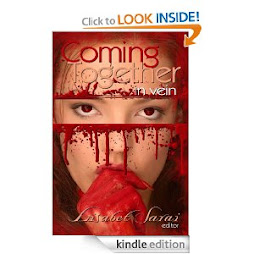

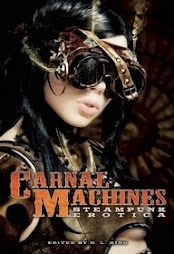

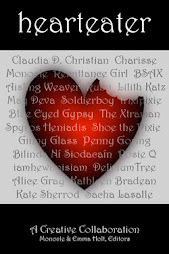
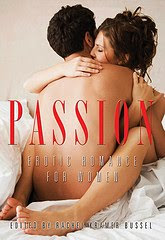
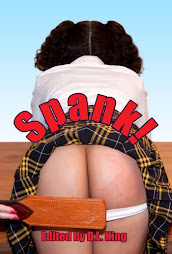



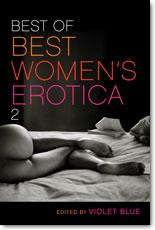

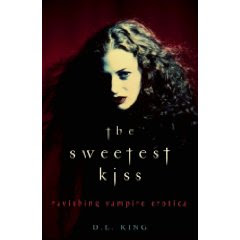


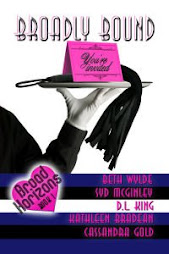.jpg)
